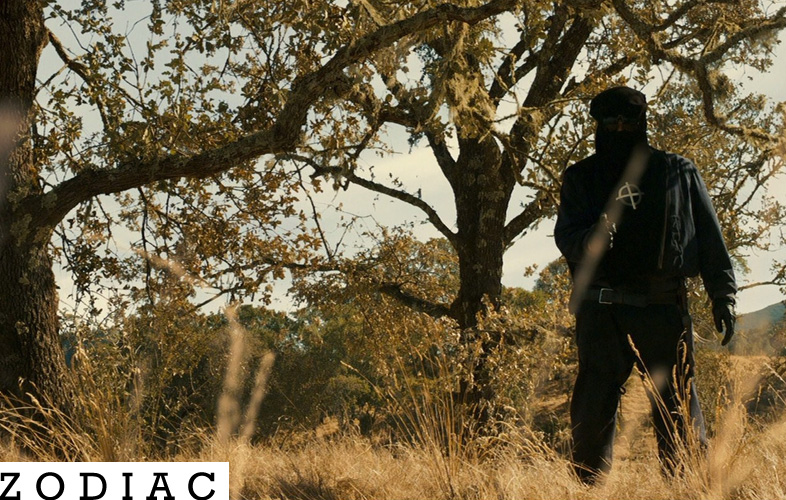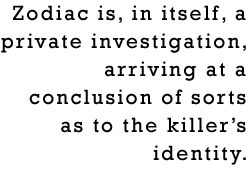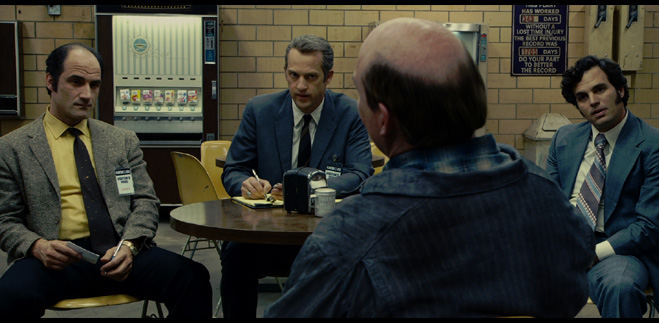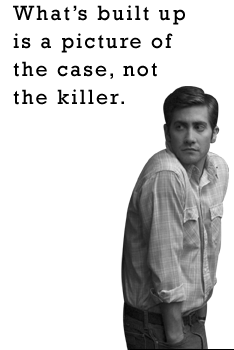Feature
Top 10 films of our lifetime #4: Zodiac
Movie Feature
Ed Williamson
23rd September 2014
Possibly the most underrated movie on this list, Zodiac was nominated for a big fat ZERO Academy Awards, which is insane, because it's by far the best film David Fincher has made this century, and it's teeming with quality: flawless cinematography, invisible CG magic, and a cast groaning with talent. Testament to its thrilling three-hour running time is the fact that only after I had finished watching it recently did I realise it marked the first meeting of Avengers 'Science Bros' Robert Downey Jr and Mark Ruffalo - Ali.

 Director: David Fincher / Cast: Jake Gyllenhaal, Robert Downey Jr, Mark Ruffalo
Director: David Fincher / Cast: Jake Gyllenhaal, Robert Downey Jr, Mark Ruffalo
Writers: James Vanderbilt, Robert Graysmith (book) / Cinematography: Harris Savides
 |  t is estimated that at any one time there are between 35 and 50 serial killers at large in the United States, and there are probably as many new films about them each year. Serial killing, while ethically a bit dubious, makes fascinating fictional subject matter. t is estimated that at any one time there are between 35 and 50 serial killers at large in the United States, and there are probably as many new films about them each year. Serial killing, while ethically a bit dubious, makes fascinating fictional subject matter.
I suppose the reason the subject has long held my interest and will most likely one day spill over into imitation is that it represents the most extreme form of human behaviour there is. Society is fascinated by serial killers because they do anything they want, and on some level we'd all like that kind of freedom from constraint, whether or not we fancy keeping a severed head in the fridge. David Fincher's Zodiac, about the investigation into the eponymous, still-unidentified murderer at large in the San Francisco Bay area through the late sixties and early seventies, doesn't fit the true crime movie template. It is not concerned, particularly, with any sort of vicarious thrills, or with the charisma of the killer or cop. It is largely about police procedure and its minute detail. It is, in itself, a private investigation, arriving at a conclusion of sorts as to the killer's identity. The scenes depicting the Zodiac's crimes are mounted in forensic detail using witness statements as their basis, to the extent that the dialogue in them often sounds odd or stilted because it's what the participants said verbatim. The film's timeline is one you'd cut ruthlessly if editing a work of pure fiction. It's a study in verisimilitude, obsessed with telling the truth just as much as its protagonist is obsessed with uncovering it. Police procedure is largely drudgery and admin, but only cops actually realise this. San Francisco Chronicle cartoonist Robert Graysmith, as portrayed like an ingenue in Zodiac by Jake Gyllenhaal, is like a guy watching CSI and thinking it's the coolest thing in the world. On the staff in 1969 when the Zodiac began sending ciphers to the paper supposedly containing clues to his identity, Graysmith tried to solve a couple and became obsessed with the case. He's you and me, reading a serial killer's Wikipedia page, fascinated with the puzzles, the mystery, the audacity. Journalist Paul Avery (Robert Downey Jr) represents the shlock that surrounds any serial murder case: though Downey imbues him with an integrity he would've been forgiven for omitting, Avery is out to unmask the Zodiac before the police do and grab a headline. | . |

| . |
Most interesting is that the cop actually in charge of the investigation is the least interesting of all. Mark Ruffalo's Detective Dave Toschi (whom you don't even meet for the first half hour) isn't an investigator blessed with inspiration. He doesn't have sudden strokes of genius or spot the clue everyone else overlooks. He's mainly just a gumshoe, doing his job competently and effectively, making little breakthroughs here and there but usually coming up short. He cares about the case but he sleeps soundly at night. The focus on the investigation rather than the killer is at least partly down to the Zodiac's having never been caught, but still there is a definite decision not to show anything wholly fictionalized about him; to cut suddenly to the shadowy figure in the room decorated with scrawled Bible verse on the walls, methodically assembling a necklace of ears. There is no reticence, even, to include scenes in which he might have been misidentified. The man who picked up a woman on a Northern California highway and drove her around for two hours threatening to kill her and her baby is far from certain to have been the Zodiac: though he took responsibility in a later letter, he uncharacteristically failed to give corroborating details and the woman's multiple statements were all wildly different. The phone-in caller to Melvin Belli on TV who makes a horrible, blood-curdling sound (one of the film's most genuinely chilling moments) like a man possessed was later found to have been an imposter; an inmate calling from a mental institution. But we're shown these scenes anyway, and they're treated with the same dramatic reverence as the rest, because what's being built up is a picture of the case, not the killer. Why Fincher made this decision, when a more straightforward psychological mystery-thriller, especially with his Se7en pedigree, would probably have shifted more units (Zodiac lost money at the box office), speaks to a desire to do more than just make a movie. Graysmith's two books, the basis for the film, finger Arthur Leigh Allen (who died in 1992) as the Zodiac, and Fincher was aware of the responsibility of convicting Allen in the public's mind, as a widely-seen movie easily can. I treated Oliver Stone's thesis in JFK as all but fact for years, without even listening to counterarguments. I mean, Kevin Costner did a half-hour monologue on it: what more evidence do you need? But Zodiac shares common ground with JFK, and even with United 93, in taking events that loom large within the American psyche and treating them with real journalistic rigour and an insistence on accurate reportage verging on documentary, albeit with a bias towards one conclusion. This sort of unyielding factual resolve is in short supply in an age when hits rule journalistic impulses and writers publish first and fact-check later. Released just as this ADD culture was getting into its stride, Zodiac represents a rather old-school type of filmmaking, unconcerned with the sensational or the big chase scene for the trailer. It knows what you're expecting: a charismatic killer taunting the police, a genius cop making sudden, inspired breakthroughs and chasing him down. But it doesn't let you have it. You are not in charge. A man killed others; you don't know why and you never will, but you're going to see exactly how, and form your own opinions. For better or worse, this is the Zodiac speaking.  |  |
#10: The Cabin In The Woods by Matt
#9: Kiss Kiss Bang Bang by Matt
#8: Let The Right One In by Neil
#7: Inception by Matt
#6: There Will Be Blood by Ali
#5: Scott Pilgrim Vs The World by Ali
Follow us on Twitter @The_Shiznit for more fun features, film reviews and occasional commentary on what the best type of crisps are.
We are using Patreon to cover our hosting fees. So please consider chucking a few digital pennies our way by clicking on this link. Thanks!
